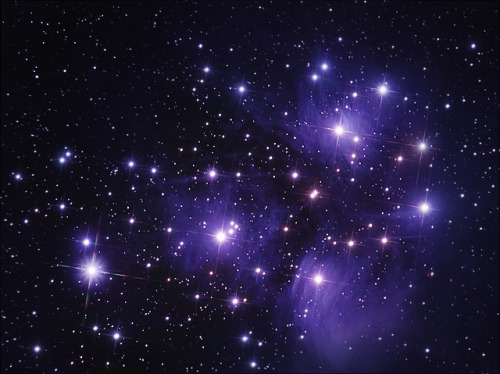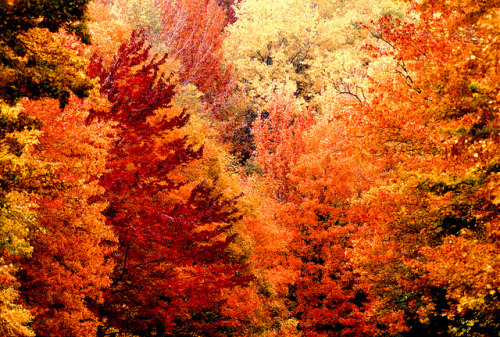Monstrous-mind - The Monster Mind

More Posts from Monstrous-mind and Others

Pleiades by Chuck Manges
🍃🍂🍁🎃
![Fall Colors In The White Mountains Of New Hampshire [OC][1600x1067] By: Bckpkrs](https://64.media.tumblr.com/ff891d0eb5e06185fb1760497cd5c5da/58a249b5dcd3e147-6d/s500x750/f45b4249f2d7683c278bac67dda3202a095e71c2.jpg)
Fall colors in the White Mountains of New Hampshire [OC][1600x1067] by: bckpkrs


Saturn - False Color - 2004 and 2014
Credit: NASA/JPL-Caltech/SSI/CICLOPS/Kevin M. Gill
A Mesmerizing Model of Monster Black Holes
Just about every galaxy the size of our Milky Way (or bigger) has a supermassive black hole at its center. These objects are ginormous — hundreds of thousands to billions of times the mass of the Sun! Now, we know galaxies merge from time to time, so it follows that some of their black holes should combine too. But we haven’t seen a collision like that yet, and we don’t know exactly what it would look like.

A new simulation created on the Blue Waters supercomputer — which can do 13 quadrillion calculations per second, 3 million times faster than the average laptop — is helping scientists understand what kind of light would be produced by the gas around these systems as they spiral toward a merger.
The new simulation shows most of the light produced around these two black holes is UV or X-ray light. We can’t see those wavelengths with our own eyes, but many telescopes can. Models like this could tell the scientists what to look for.
You may have spotted the blank circular region between the two black holes. No, that’s not a third black hole. It’s a spot that wasn’t modeled in this version of the simulation. Future models will include the glowing gas passing between the black holes in that region, but the researchers need more processing power. The current version already required 46 days!

The supermassive black holes have some pretty nifty effects on the light created by the gas in the system. If you view the simulation from the side, you can see that their gravity bends light like a lens. When the black holes are lined up, you even get a double lens!
But what would the view be like from between two black holes? In the 360-degree video above, the system’s gas has been removed and the Gaia star catalog has been added to the background. If you watch the video in the YouTube app on your phone, you can moved the screen around to explore this extreme vista. Learn more about the new simulation here.
Make sure to follow us on Tumblr for your regular dose of space: http://nasa.tumblr.com.
List of extrasolar candidates for liquid water
The following list contains candidates from the list of confirmed objects that meet the following criteria:
Confirmed object orbiting within a circumstellar habitable zone of Earth mass or greater (because smaller objects may not have the gravitational means to retain water) but not a star
Has been studied for more than a year
Confirmed surface with strong evidence for it being either solid or liquid
Water vapour detected in its atmosphere
Gravitational, radio or differentation models that predict a wet stratum
55 Cancri f

With a mass half that of Saturn, 55 Cancri f is likely to be a gas giant with no solid surface. It orbits in the so-called “habitable zone,” which means that liquid water could exist on the surface of a possible moon. ]
Proxima Centauri b

Proxima Centauri b is an exoplanet orbiting in the habitable zone of the red dwarfstar Proxima Centauri, which is the closest star to the Sun and part of a triple star system. It is located about 4.2 light-years from Earth in the constellation of Centaurus, making it the closest known exoplanet to the Solar System.
Gliese 581c

Gliese 581c gained interest from astronomers because it was reported to be the first potentially Earth-like planet in the habitable zone of its star, with a temperature right for liquid water on its surface, and by extension, potentially capable of supporting extremophile forms of Earth-like life.
Gliese 667 Cc

Gliese 667 Cc is an exoplanet orbiting within the habitable zone of the red dwarf star Gliese 667 C, which is a member of the Gliese 667 triple star system, approximately 23.62 light-years away in the constellation of Scorpius.
Gliese 1214 b

Gliese 1214 b is an exoplanet that orbits the star Gliese 1214, and was discovered in December 2009. Its parent star is 48 light-years from the Sun, in the constellation Ophiuchus. As of 2017, GJ 1214 b is the most likely known candidate for being an ocean planet. For that reason, scientists have nicknamed the planet “the waterworld”.
HD 85512 b

HD 85512 b is an exoplanet orbiting HD 85512, a K-type main-sequence star approximately 36 light-years from Earth in the constellation of Vela.
Due to its mass of at least 3.6 times the mass of Earth, HD 85512 b is classified as a rocky Earth-size exoplanet (<5M⊕) and is one of the smallest exoplanets discovered to be just outside the inner edge of the habitable zone.
MOA-2007-BLG-192Lb

MOA-2007-BLG-192Lb, occasionally shortened to MOA-192 b, is an extrasolar planet approximately 3,000 light-years away in the constellation of Sagittarius. The planet was discovered orbiting the brown dwarf or low-mass star MOA-2007-BLG-192L. At a mass of approximately 3.3 times Earth, it is one of the lowest-mass extrasolar planets at the time of discovery. It was found when it caused a gravitational microlensing event on May 24, 2007, which was detected as part of the MOA-II microlensing survey at the Mount John University Observatory in New Zealand.
Kepler-22b

Kepler-22b, also known by its Kepler object of interest designation KOI-087.01, is an extrasolar planet orbiting within the habitable zone of the Sun-like star Kepler-22. It is located about 587 light-years (180 pc) from Earth in the constellation of Cygnus. source

🍁🍂🌄

🐈🌌🚀



Alien Directed by Ridley Scott (1979)
🔭🌃🌌
orionids meteor shower
-
 come-get-psalm liked this · 1 year ago
come-get-psalm liked this · 1 year ago -
 whretfrmyplushies reblogged this · 1 year ago
whretfrmyplushies reblogged this · 1 year ago -
 whretfrmyplushies liked this · 1 year ago
whretfrmyplushies liked this · 1 year ago -
 come-get-psalm reblogged this · 1 year ago
come-get-psalm reblogged this · 1 year ago -
 witchittude liked this · 4 years ago
witchittude liked this · 4 years ago -
 thenewwyorker liked this · 4 years ago
thenewwyorker liked this · 4 years ago -
 xxbetarelli reblogged this · 5 years ago
xxbetarelli reblogged this · 5 years ago -
 mimseysomeday liked this · 5 years ago
mimseysomeday liked this · 5 years ago -
 candlelit-cottage reblogged this · 5 years ago
candlelit-cottage reblogged this · 5 years ago -
 whatifkeepingitrealgoeswrong reblogged this · 5 years ago
whatifkeepingitrealgoeswrong reblogged this · 5 years ago -
 ewokk reblogged this · 5 years ago
ewokk reblogged this · 5 years ago -
 justanotherfangirl88 liked this · 5 years ago
justanotherfangirl88 liked this · 5 years ago -
 xokristennichole reblogged this · 5 years ago
xokristennichole reblogged this · 5 years ago -
 capturelittlemoments reblogged this · 5 years ago
capturelittlemoments reblogged this · 5 years ago -
 bri-v-m reblogged this · 5 years ago
bri-v-m reblogged this · 5 years ago -
 toeswhitepusssytight reblogged this · 5 years ago
toeswhitepusssytight reblogged this · 5 years ago -
 xlumaj reblogged this · 5 years ago
xlumaj reblogged this · 5 years ago -
 spooky-scary-pumpkins reblogged this · 5 years ago
spooky-scary-pumpkins reblogged this · 5 years ago -
 fadleyhaith reblogged this · 5 years ago
fadleyhaith reblogged this · 5 years ago -
 viktoryblog liked this · 5 years ago
viktoryblog liked this · 5 years ago -
 dea-dell-amore liked this · 5 years ago
dea-dell-amore liked this · 5 years ago -
 dhjsigosoheveb liked this · 5 years ago
dhjsigosoheveb liked this · 5 years ago -
 allwillbecomeclear liked this · 5 years ago
allwillbecomeclear liked this · 5 years ago -
 wearenevergettingbecktogether liked this · 5 years ago
wearenevergettingbecktogether liked this · 5 years ago -
 hypnopiecowboypony-blog liked this · 5 years ago
hypnopiecowboypony-blog liked this · 5 years ago -
 gm0rk81 liked this · 5 years ago
gm0rk81 liked this · 5 years ago -
 goawaythisismyblog reblogged this · 5 years ago
goawaythisismyblog reblogged this · 5 years ago -
 thefameartpopmonster-blog liked this · 5 years ago
thefameartpopmonster-blog liked this · 5 years ago -
 murderdocs liked this · 5 years ago
murderdocs liked this · 5 years ago -
 starrgloww liked this · 5 years ago
starrgloww liked this · 5 years ago -
 messagefrommyheart reblogged this · 5 years ago
messagefrommyheart reblogged this · 5 years ago -
 pluviophiles-and-melomanie liked this · 5 years ago
pluviophiles-and-melomanie liked this · 5 years ago -
 aaronjs-world reblogged this · 5 years ago
aaronjs-world reblogged this · 5 years ago -
 loreandfanfic liked this · 5 years ago
loreandfanfic liked this · 5 years ago -
 merissknits liked this · 5 years ago
merissknits liked this · 5 years ago
My ambition is handicapped by laziness. -C. Bukowski Me gustan las personas desesperadas con mentes rotas y destinos rotos. Están llenos de sorpresas y explosiones. -C. Bukowski. I love cats. Born in the early 80's, raised in the 90's. I like Nature, Autumn, books, landscapes, cold days, cloudy Windy days, space, Science, Paleontology, Biology, Astronomy, History, Social Sciences, Drawing, spending the night watching at the stars, Rick & Morty. I'm a lazy ass.
222 posts